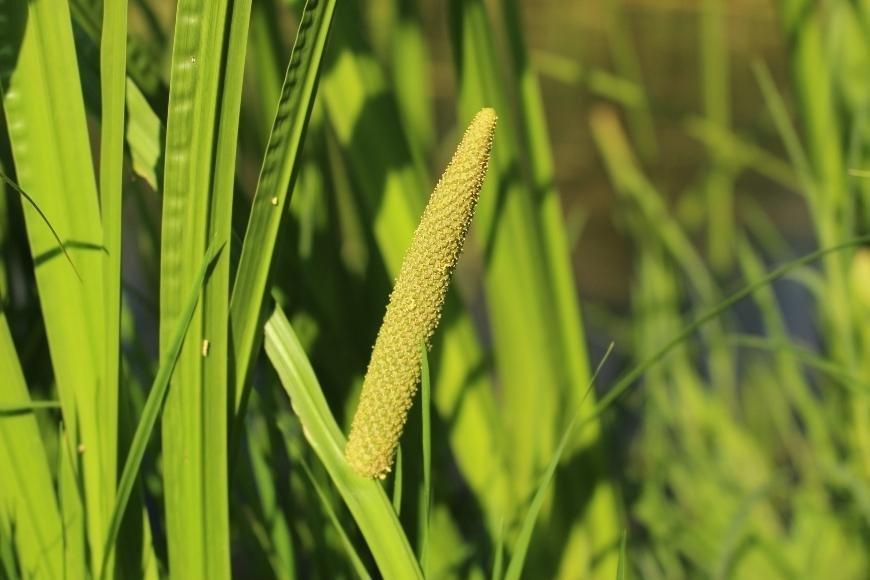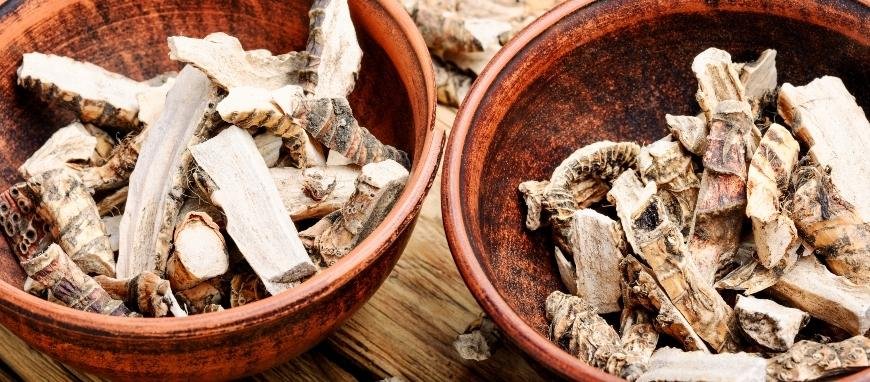What is Calamus
Explore what is Calamus, its history, effects, safety, and impact on mental health in our comprehensive guide to this ancient plant.

What is Calamus? This intriguing plant, scientifically known as Acorus calamus, has a rich history and an array of effects on both the body and mind. In this blog post, we'll explore the fascinating history and uses of calamus across various cultures throughout time, as well as its potential benefits when consumed.
We'll explore the fascinating history of calamus use across various cultures throughout time. Then, we'll examine the different effects that can be experienced when consuming this unique plant. Additionally, we'll discuss potential side effects and safety concerns related to its use.
Finally, we will touch upon how acorus calamus interacts with mental health – a topic particularly relevant for our young adult audience interested in recreational drug exploration. So let's embark on this journey together to answer once more: What is Calamus?
Table of Contents:
- What is Calamus?
- Description: A Brief Overview
- History of Calamus Use
- Effects of Calamus Use
- Side Effects of Calamus Use
- Is Calamus Safe?
- Calamus and Mental Health
- Frequently Asked Questions What is Calamus
- Conclusion
What is Calamus?
Acorus calamus, commonly known as calamus or sweet flag, is a perennial plant native to Asia and Europe. This fascinating herb has been used for centuries in traditional medicine and spiritual practices due to its various properties. In this section, we will explore the characteristics of calamus and delve into some interesting facts about this unique plant.
Description: A Brief Overview
Calamus, a member of the Acoraceae family, is typically found near aquatic habitats like ponds, lakes and rivers. The plant features long sword-shaped leaves that resemble those of an iris. Its flowers are small with a greenish-yellow hue arranged on a cylindrical spike called spadix.
The most notable part of the plant is its rhizome - an underground stem that grows horizontally beneath the soil surface. The acorus calamus rhizome contains essential oils responsible for its characteristic fragrance reminiscent of cinnamon or nutmeg when dried.
Culinary Uses:
- Sweeteners: In ancient times people chewed on fresh or dried pieces of rhizomes to sweeten their breath.
- Beverages: Rhizomes were also used in brewing beer before hops became popularized.
- Flavoring agent: Due to its aromatic nature it was often added as flavoring agents in foods like candies & liquors
Calamus has a long and varied history of use, from traditional medicinal practices to modern day recreational uses. It is an interesting plant with many potential benefits that are still being explored today. Jumping to the next point, let's look at how calamus has been used in the past.
History of Calamus Use
Calamus, also known as Acorus calamus, has a rich history that dates back thousands of years. This plant has been used for various purposes across different cultures and civilizations. In this section, we will investigate the historic utilization of calamus and how it has been incorporated into traditional healing practices.
Egyptian Traditions
In ancient Egypt, calamus was highly valued for its aromatic properties. The Egyptians used it in perfumes and incense to create pleasant scents during religious ceremonies. They believed that the fragrance had spiritual significance and could help them connect with their gods more effectively. You can learn more about Egyptian rituals involving fragrances by visiting this informative article on perfume and incense in ancient Egypt.
Ayurvedic Medicine
The use of calamus is deeply rooted in Ayurvedic medicine - a holistic healing system originating from India over 5,000 years ago. Practitioners considered it a powerful herb capable of balancing all three doshas (vital energies) within the body: Vata, Pitta, Kapha. Calamus oil was also applied topically, according to Ayurvedic texts, for relieving joint pain. Additionally, Ayurvedic texts mention using calamus oil topically to alleviate joint pain.
Traditional Chinese Medicine (TCM)
In Traditional Chinese Medicine (TCM), Acorus species were utilized primarily for their calming effects on the mind and spirit (source). Practitioners believed that calamus could help treat anxiety, insomnia, and other mental health issues by harmonizing the flow of Qi (life force) within the body. Moreover, it was used to address memory problems and improve cognitive function.
Native American Practices
Native Americans also recognized the benefits of calamus and incorporated it into their traditional medicine. They utilized various parts of the plant for different purposes: leaves were chewed to relieve toothaches while roots were boiled in water to create a tea that helped with colds or respiratory issues. Some tribes even considered calamus a sacred herb due to its spiritual properties.
In summary, throughout history, calamus has been revered for its diverse applications across numerous cultures. Its uses ranged from fragrances in ancient Egypt to holistic healing practices in Ayurvedic medicine and Traditional Chinese Medicine. As we continue exploring this fascinating plant further in subsequent sections, you'll gain an understanding of why it remains popular today among those seeking natural remedies.
Centuries of evidence point to calamus being employed in bygone eras, such as ancient Egypt and India. Its effects on the human body have long intrigued scientists, making its exploration a topic worth further study. Moving forward, we will explore the various effects of calamus use on humans today.
Effects of Calamus Use

Calamus, also known as sweet flag or Acorus calamus, has been used for centuries due to its various effects on the mind and body. From traditional medicine to modern recreational use, this versatile plant offers a range of benefits that have piqued the interest of young adults looking to explore alternative substances.
Potential Cognitive Benefits
The primary reason many people turn to calamus is for its potential cognitive-enhancing properties. Some users report experiencing increased mental clarity, focus, and creativity after consuming the plant. This may be attributed to compounds found in calamus called acorone and asarone, which are believed to have stimulating effects on the central nervous system.
Aphrodisiac Properties
In addition to cognitive enhancement, some individuals believe that calamus possesses aphrodisiac qualities. While scientific research is limited in this area, anecdotal evidence suggests that using calamus can lead to heightened sexual desire and arousal. It is important to remember that the effects of calamus may differ depending on a person's unique chemistry and dosage.
Mood Enhancement & Relaxation
- Anxiolytic Effects: Many users claim that taking small doses of calamus can help reduce anxiety levels by promoting relaxation without causing drowsiness or lethargy commonly associated with other sedatives like benzodiazepines.
- Euphoria: Some people experience feelings of euphoria when consuming larger amounts of calamus root powder or essential oil preparations made from it - though such experiences tend not only be subjective but also dependent upon one's personal tolerance and individual body chemistry.
Traditional Medicinal Uses
Apart from recreational use, calamus has a long history of being used in traditional medicine for various ailments. Some of its medicinal uses include:
- Assisting with digestive problems such as dyspepsia, flatulence and abdominal bloating by activating the production of enzymes and bile.
- Relieving pain due to its analgesic properties - particularly when applied topically in the form of an essential oil or poultice.
- Reducing inflammation thanks to compounds like asarone that have been shown to possess anti-inflammatory effects.
Given its potential to provide cognitive benefits, improve mood, and support overall wellbeing - yet with the need for more research into its risks and side-effects - calamus is a fascinating herb that warrants further exploration. As with any substance experimentation should be approached responsibly - ensuring proper dosage guidelines are followed along with awareness about possible side-effects or interactions other medications one might be taking concurrently.
Calamus use can have both positive and negative effects on users, depending on the individual. It is important to be aware of potential side effects when considering calamus as a recreational drug.
Side Effects of Calamus Use
While calamus has been used for centuries and is known to offer various benefits, it's essential to be aware of the potential side effects associated with its use. Like any other substance, calamus may affect individuals differently, so it's crucial to understand what risks you might face when using this plant.
Potential Side Effects
- Nausea: Some users have reported experiencing nausea after consuming calamus. This could be due to individual sensitivities or excessive consumption.
- Vomiting: In some cases, nausea can progress into vomiting if the user consumes too much calamus or has a particularly sensitive stomach.
- Dizziness: Calamus can cause dizziness in some users, especially if taken in large doses or combined with other substances that impact balance and coordination.
- Allergic Reactions: As with any plant-based substance, there is always a risk of an allergic reaction. Symptoms may include itching, rash, swelling or difficulty breathing. If you suspect an allergic reaction after using calamus,seek medical attention immediately.
Risk Factors for Adverse Reactions
Certain factors may increase your likelihood of experiencing side effects from using calamus. These include:
- Taking high doses: Consuming large amounts of calamus increases the chances of adverse reactions such as dizziness and vomiting.
- Combining with other substances: Mixing calamus with other drugs, including alcohol and prescription medications, can increase the risk of side effects or lead to unpredictable interactions.
- Genetic predisposition or existing health issues can make some individuals more vulnerable to experiencing side effects.
If you're considering using calamus for its potential benefits, it's essential to start with a low dose and gradually increase as needed. Additionally, consult your healthcare provider before combining calamus with any other substances or if you have concerns about potential risks related to your personal health situation.
Individuals may encounter differing reactions to calamus intake, so it is wise to be aware of the potential repercussions prior to utilization. Despite its potential risks, the safety of calamus for recreational use remains uncertain.
Is Calamus Safe?

In the world of recreational substances, safety is a top priority. With calamus being an ancient plant with various uses throughout history, it's essential to assess its safety for modern users.
Potential Interactions and Contraindications
As with any substance, there may be potential interactions and contraindications when using calamus. It is crucial to consider your current medications and health conditions before trying this plant. For example, calamus should not be used during pregnancy or breastfeeding, as it can stimulate uterine contractions which might lead to miscarriage or premature labor.
Before using calamus, it is important to consult your healthcare provider if you are taking medications that affect blood clotting (e.g., anticoagulants like warfarin), as this may increase the risk of bleeding.
Dosage Considerations
- Start low: As with any new substance, start with a low dose to gauge how your body reacts to calamus. This will help minimize adverse effects while allowing you to determine if this plant works well for you.
- Avoid excessive use: While moderate use of calamus has been reported safe by many users in the psychedelic community, consuming large amounts could potentially cause negative side effects such as nausea or vomiting.
- Tinctures vs. raw root: The method of consumption also plays a role in determining dosage levels; tinctures often require lower doses compared to consuming raw roots due their concentrated nature.
FDA Regulation Status
The U.S. The FDA has deemed calamus to be hazardous for human consumption due to the presence of beta-asarone, a potentially carcinogenic compound present in some varieties. However, this classification is primarily aimed at food additives rather than personal use.
It's important to note that not all calamus plants contain significant amounts of beta-asarone; certain strains such as Acorus Calamus var. Americanus are known to have lower levels compared to other varieties like Acorus Calamus var. Eurasian.
Responsible Use
To ensure safe usage of calamus, follow these guidelines:
- Research: Familiarize yourself with the plant's history, effects, side effects and potential interactions before using it.
- Purchase from reputable sources: Ensure you're obtaining high-quality products by purchasing from trusted vendors or growing your own plants if possible.
- Avoid combining substances: Mixing calamus with other psychoactive substances can increase risks and adverse effects - always err on the side of caution when experimenting with new combinations.
In conclusion,
Ultimately, it is critical to assess the potential dangers of calamus prior to making a decision regarding its use. It is equally important to consider its effects on mental health when using this substance. With that in mind, let's explore how calamus may affect our mental wellbeing and emotional stability.
Calamus and Mental Health
In this section, we will explore the impact of calamus on mental health. It is critical to comprehend how its utilization may influence our passionate prosperity, as calamus has psychoactive properties.
The Connection Between Calamus and Mental Health
Calamus has been traditionally used in various cultures for its calming effects on the mind. The active compound found in calamus root, called asarone, is believed to have sedative and anxiolytic (anti-anxiety) properties. This makes it a potential natural remedy for those dealing with stress or anxiety disorders.
Potential Benefits of Calamus for Mental Health
- Anxiety Relief: Some studies suggest that asarone can help reduce symptoms of anxiety by acting on certain neurotransmitters in the brain responsible for regulating mood and emotions.
- Mood Enhancement: The calming effect of calamus may also contribute to improved mood levels, making users feel more relaxed and at ease during stressful situations.
- Cognitive Function: There is some evidence indicating that calamus might improve cognitive function by increasing blood flow to the brain, which could potentially enhance memory retention and focus abilities.
Risks Associated with Calamus Use for Mental Health
While there are potential benefits associated with using calamus as a natural remedy for mental health issues, it's important to consider possible risks before incorporating this plant into your wellness routine:
- Allergic Reactions: If you're allergic to plants in the Araceae family, you may experience an allergic reaction when using calamus. Symptoms can include skin rashes, itching, and swelling.
- Drug Interactions: Calamus might interact with certain medications such as sedatives or antidepressants. It's essential to consult your healthcare provider before combining calamus with any prescription medication.
- Potential Toxicity: High doses of calamus root can be toxic due to its high concentration of beta-asarone. Prolonged use of calamus without professional advice is not suggested.
Incorporating natural remedies like calamus into your mental health routine should always be done under the supervision of a knowledgeable healthcare practitioner who understands both the benefits and risks associated with these substances. Therefore, it is important to consult a healthcare professional before incorporating natural remedies like calamus into your mental health routine in order to make the most informed decisions and protect yourself from any potential harm.
Frequently Asked Questions What is Calamus
Why is calamus banned in the US?
Calamus is banned in the US due to its content of asarone, a compound found to be potentially carcinogenic and neurotoxic. The FDA classified it as unsafe for human consumption in 1968 after studies on rats showed negative effects. However, some argue that traditional preparations and moderate use may not pose significant risks.
What is the purpose of calamus?
The primary purpose of calamus has been its use as a medicinal herb and stimulant throughout history. It has been used for treating digestive issues, relieving pain, reducing inflammation, improving mental clarity, and even as an aphrodisiac. In addition to these uses, it's also valued for its aromatic properties.
What is calamus called today?
Calamus goes by several names today including sweet flag (Acorus Calamus), rat root or vacha depending on regional traditions. Its scientific name remains Acorus Calamus L., but other common names include myrtle grass or beewort due to its attractive scent which draws bees towards it.
What does calamus symbolize?
In various cultures throughout history, calamus has symbolized different things such as love and desire (Ancient Egypt), wisdom (Ayurveda) or protection against evil spirits (Native American tribes). Overall though, this versatile plant represents strength & resilience given how well it can grow under adverse conditions like swamps & marshes.
Conclusion
After learning about Calamus, it is clear that this plant has a long history of use in traditional medicine and spiritual practices. Nevertheless, the impacts of this plant on one's body are not fully understood and could possibly bring about adverse reactions. While some people may find benefits from using Calamus, it is important to approach any substance with caution and educate oneself before use.






































































































































